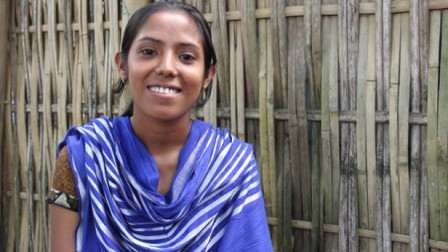Bangladesh: How Birth Certificates Help Fight Child Marriage
Birth registration can play a crucial role in reducing child marriage, but this depends on enforcing existing laws and having comprehensive systems in place to register major life events, including deaths, marriages, adoptions and births. A ministerial conference of Asia-Pacific countries confronted this issue last November.
By Jessica Lomelin, 24 November 2014
Four years ago, Rubi took the exam for her Secondary School Certificate in Dinajpur, Bangladesh. She rushed home to share her results with her family, but when she arrived, she was told that her parents were going to marry her off. She was then 15 years old.

Rubi, 19, managed to avoid early marriage because she could prove her age. Photo by: Jessica Lomelin / Plan International
“I was so sad because all I wanted to do was share the good news of my exam results, but that changed once I realized they had arranged my marriage,” said Rubi, a vibrant, ambitious girl and the oldest sibling in a family of 10 who was unable to convince her family that she was too young to get married. Desperate and not knowing where to turn, Rubi told her school friends and a teacher, who put them in touch with Plan International’s partner organization.
As an ambassador of Plan’s global “Because I am a Girl” campaign, the now 19-year-old has long been involved with the NGO, raising awareness of the importance of birth registration and other key issues, so she knew the legal age for marriage in Bangladesh was 18.
Together, they visited the Union Council Office to meet with the chairman — who Rubi knew from her involvement with the local child forum group — to explain her situation.
Advocating for her rights
“I told him that I have the right to an education until age 18 and that my parents must honour that,” Rubi said. “The chairman went to my home and tried to speak to my parents, but initially they weren’t convinced.”
Together, the girl and her parents went to chairman’s office. At first, her parents tried to discreetly change the age on the birth certificate, but the local official put a stop to it. After several visits and discussions, the chairman spoke to Rubi’s parents about the legal implications of child marriage and convinced them to abandon the idea.
Rubi’s parents tried to arrange their daughter’s marriage as they couldn’t afford Rubi’s education and general upbringing, but now they admit they were wrong.
“Now, I realize it was good for Rubi that her marriage didn’t take place when she was a child,” explained her father.
The value of the birth certificate
Bangladeshi law requires parents to register births within 45 days. Although there is a $65 penalty for missing the deadline, until recently many parents ignored the law as well as the importance of birth registration and would put off registering their child’s birth until it was absolutely necessary.
For Rubi, that time came when she was 6 years old and denied admission to primary school because she was unable to provide a birth certificate. Her parents took her to the local government office and were finally able to secure the card so she could attend.
Child marriage context
Bangladesh has the second-highest rate of child marriage in the world, second only to Niger. According to a 2013 report commissioned by Plan, 64 of all Bangladeshi women aged 20–24 were married before the age of 18.
The research, conducted as part of the Because I am a Girl campaign, showed that marriage is widely considered a family matter in the country, where it’s common for the father to decide for his daughter. Most families believe that by arranging a marriage with a suitable groom, they are providing girls with social and economic security.
Globally, 1 in 5 girls around the world is denied an education by the daily realities of poverty, violence and discrimination. Every day, girls are taken out of school, married far too young and subjected to violence in school. Not only is this unjust — it’s also a huge waste of potential with serious global consequences.
Birth registration has the potential to play a crucial role in reducing child marriage in, but this depends on enforcing existing laws and comprehensive systems in place to register major life events, including deaths, marriages, adoptions and births.
Child marriage, birth registration and the wider spectrum of civil registration and vital statistics — or CRVS — are high on the agenda of many Asian governments as they look beyond the Millennium Development Goals and toward the post-2015 agenda.
With 135 million children effectively invisible because they have not been registered, the region’s governments gathered in November 2014 in Bangkok for the Ministerial Meeting on CRVS in Asia-Pacific to agree on a framework to ensure all countries have effective CRVS systems in place along with strong legal systems to support their implementation.
A family advocating for birth registration
As for Rubi, she is now 19 and continues to be active with Plan, serving as a community worker and conducting family surveys on a variety of issues. She is also spreading her message far and wide. In 2011, she traveled to Australia to share her personal story and raise awareness over the plight of child marriage and the importance of birth registration, as well as the challenges of growing up in rural Bangladesh.
The future is now looking much brighter for Rubi, who is currently studying Islamic history.
“After getting my birth certificate, I have been able to move ahead. I want to say to everybody: please get your births registered — not only for school or to get a job, this certificate proves your identity,” said Rubi, who aspires to become a teacher. “From childhood, I always wished to work for my society. In the future, when I am an adult I plan to support my community.”


